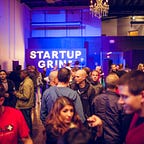VC Corner Q&A: Eric Anderson of Scale Venture Partners
Eric is a Partner at Scale Venture Partners, where he focuses on investments in cloud infrastructure and security. Before Scale, Eric led early Google Cloud and Amazon Web Services product teams. At Google, he was a Product Manager in the Data Analytics and Machine Learning group. He led the team that launched Cloud Dataprep and key components of Cloud Dataflow.
Read on to learn more about Scale Venture Partners and Eric Anderson’s insights!
— What is Scale’s mission?
Scale is an early-stage venture capital firm. We typically lead Series A or Series B rounds after a company has signed their first customers and is ready to move from founder-led growth to a repeatable, go-to-market machine. We invest in intelligent business software, and believe that the intersecting trends in cloud, AI and data are transforming the entire enterprise stack and expanding the markets software can address. We’re interested in intelligent business software in markets like DataOps, DevOps, Digital Health, Fintech, Open Source, Productivity, Security and Vertical SaaS.
For 20 years, we have focused on business software and helping founders build lasting companies. We do this through a Scaling Platform that uses executive networks, go-to-market playbooks, private communities, and Scale Studio benchmarks that help companies scale in a deliberate and meaningful way. Scale is behind some of the biggest software leaders like Bill.com, Box, Docusign, Hubspot, JFrog, Root and WalkMe.
— What and when was your very first investment? What struck you about them?
I recommended Matillion, a data transformation solution provider, in 2017 and we closed in early 2018. They were lesser-known, in part because of their location in Manchester, UK, but through my relationship with Chris Degnan, the CRO of Snowflake from my days at Google, I learned that they were fundraising.
What immediately struck me about Matillion is that it is designed to be incredibly simple to use — a significant shift from the previous generations of tools. The faster learning curve and the ability of Matillion to reduce the cost of data integration development is one of the primary reasons why it is the second-highest rated product on the AWS marketplace.
— Is this someone I want to work with for the next decade? What is one thing every founder should ask themselves before walking into a meeting with a potential investor?
It’s so easy to get lost in a pitch — so it’s important to refocus on what your main objectives are. As you present, keep circling back to the notion of the core innovation you’re delivering on — let that be your North Star.
— What do you think a CEO’s top 3 company priorities should be?
Before I invest: product market fit. After, it is strategy, hiring, and fundraising.
— What is one thing you’re particularly excited about right now?
I see so much potential in open source and connectivity — there’s so much we haven’t tapped into within the promise of data and data infrastructure in general. What’s especially interesting is that we’re seeing how the enterprise has embraced open source in the way they haven’t before. The pandemic is greatly accelerating open source adoption — as an example — GitHub states 72% of Fortune 50 companies used GitHub Enterprise.
We’ve seen how connectivity has reached a deeper level with sensors and intelligence in a variety of verticals ranging from connected cars to digital healthcare. Applications used to be stand-alone and humans connected them, which now isn’t the case. Intelligent apps can orchestrate and build workflows on a cognitive level, and we’ve only just reached the surface of this. This is just the beginning for these “cognitive applications” and I’m excited to see its impact.
— Who is one founder you think we should watch?
Adam Jacob, co-founder and former CTO of Chef, a platform that helps DevOps teams ship software faster. He was a portfolio CEO for us once before with Chef. He does so many things well, but they all spring from him being a technologist who is also extremely people-centric. The former gives his work substance and the latter is a path to unlimited resources.
— What’s been a top-of-mind concern for you / your fund over the last six months?
There is more change and innovation happening in the venture capital industry now than ever before. Separating out what is going to stay and what is an artifact of excess capital is tricky, but key to advising our founders and making wise investments.
— What’s your favorite business book, blog or podcast?
The Structure of Scientific Revolutions by Kuhn. Nominally about science but if you read between the lines, you’ll find what informs underlying patterns in business and society.
— What are the top 3 qualities of every great leader?
- Competence: I remember that Amazon used to say that good leaders are “usually right” and I too have found that competence generates confidence.
- Storytelling: People think in terms of stories and it helps to provide meaning and power behind your decisions.
- Integrity: It’s critical to work alongside people that have the same core values as you are, especially if you plan to work with them for a long time.
— What’s the number one piece of advice you’d give every founder?
Focus on your strengths. Somehow we often tell people to shore up their weaknesses, which has some merit — but don’t do it at the cost of never letting your strengths shine. Steer your startup, career and hiring to complement what only you can do.
— What is one interesting thing most people won’t know about you?
I’ve got 4 kids!
